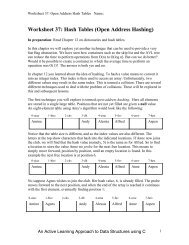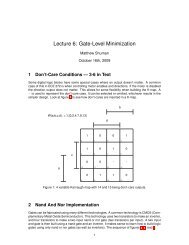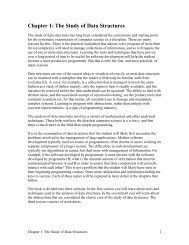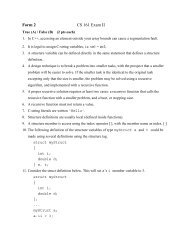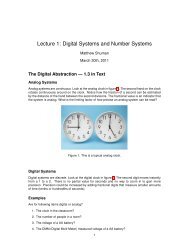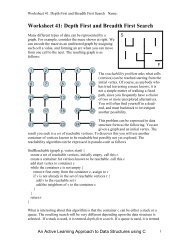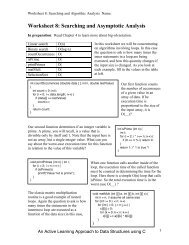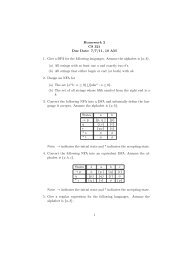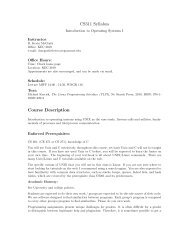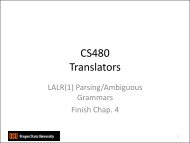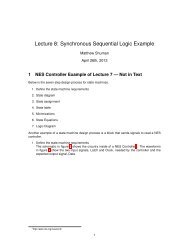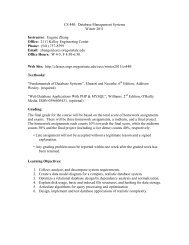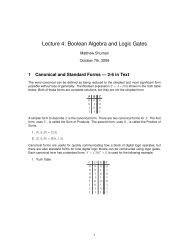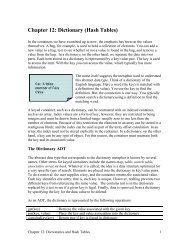Engineering Education and the Development of Expertise - Classes
Engineering Education and the Development of Expertise - Classes
Engineering Education and the Development of Expertise - Classes
You also want an ePaper? Increase the reach of your titles
YUMPU automatically turns print PDFs into web optimized ePapers that Google loves.
100 (January 2011) 1 Journal <strong>of</strong> <strong>Engineering</strong> <strong>Education</strong><br />
common teaching practices in undergraduate engineering programs <strong>of</strong>ten discourage <strong>the</strong> use<br />
<strong>of</strong> <strong>the</strong> very approaches to learning needed to construct deep underst<strong>and</strong>ing.<br />
Using data from 517 U.S. colleges <strong>and</strong> universities ga<strong>the</strong>red as part <strong>of</strong> <strong>the</strong> National Survey<br />
<strong>of</strong> Student Engagement (NSSE), Nelson Laird et al. (2008) investigated <strong>the</strong> effect <strong>of</strong><br />
discipline on students’ use <strong>of</strong> deep learning approaches as well as on <strong>the</strong> achievement <strong>of</strong><br />
three learning outcomes: student self-reported gains in personal <strong>and</strong> intellectual development,<br />
satisfaction with college, <strong>and</strong> self-reported grades. They also investigated <strong>the</strong> teaching<br />
approaches that faculty reported using across a range <strong>of</strong> disciplines. The data included<br />
survey responses from 80,000 college seniors <strong>and</strong> 10,000 faculty members (Kuh, 2003).<br />
The investigators selected three sets <strong>of</strong> items from <strong>the</strong> NSSE as a measure <strong>of</strong> deep<br />
learning approaches: (1) higher order learning, analyzing basics elements <strong>of</strong> an idea or <strong>the</strong>ory,<br />
syn<strong>the</strong>size information into new more complex forms, applied <strong>the</strong>ories/concepts to<br />
practical or new problems; (2) integrative learning, worked on paper or project that required<br />
integration <strong>of</strong> ideas from various sources, including diverse ideas, put toge<strong>the</strong>r ideas<br />
from different courses, discussed readings/classes with faculty outside <strong>of</strong> class, discussed<br />
readings/classes with o<strong>the</strong>rs outside <strong>of</strong> class; <strong>and</strong> (3) reflective learning, evaluated strengths<br />
<strong>and</strong> weaknesses <strong>of</strong> own views, tried to underst<strong>and</strong> ano<strong>the</strong>r person’s perspective by imagining<br />
how an issue looks from ano<strong>the</strong>r’s point <strong>of</strong> view, learned something that changed <strong>the</strong><br />
way you underst<strong>and</strong> an issue or concept.<br />
When combined, <strong>the</strong>se three sets <strong>of</strong> items form a scale with a reliability coefficient <strong>of</strong><br />
0.72. A complementary set <strong>of</strong> items from <strong>the</strong> faculty version <strong>of</strong> <strong>the</strong> NSSE provided information<br />
on <strong>the</strong> extent to which faculty emphasize higher order <strong>and</strong> integrative learning<br />
in <strong>the</strong>ir courses, <strong>and</strong> <strong>the</strong> importance <strong>the</strong>y place on reflective learning in <strong>the</strong> courses<br />
<strong>the</strong>y teach.<br />
The findings are discussed using Biglan classification, which categorizes academic disciplines<br />
on three dimensions: whe<strong>the</strong>r <strong>the</strong>y are pure or applied fields, whe<strong>the</strong>r <strong>the</strong>y deal with<br />
life or non-life topics, <strong>and</strong> whe<strong>the</strong>r <strong>the</strong>y are hard or s<strong>of</strong>t (whe<strong>the</strong>r <strong>the</strong>y exhibit a high or low<br />
degree <strong>of</strong> consensus about <strong>the</strong> knowledge <strong>and</strong> methods in <strong>the</strong> field) (Nelson Laird et al.,<br />
2008 p. 472). Most engineering fields fall within <strong>the</strong> hard, applied, non-life categories. The<br />
two findings most relevant to engineering are: that a positive correlation was found between<br />
<strong>the</strong> frequency <strong>of</strong> use <strong>of</strong> deep approaches to learning <strong>and</strong> <strong>the</strong> levels <strong>of</strong> student self-reported<br />
intellectual <strong>and</strong> personal development, consistent with studies <strong>of</strong> deep approaches to learning,<br />
<strong>and</strong> that <strong>the</strong> hard-s<strong>of</strong>t distinction was <strong>the</strong> strongest predictor <strong>of</strong> differences across disciplines<br />
for both senior students <strong>and</strong> faculty members. For students in hard fields, <strong>the</strong> average<br />
level <strong>of</strong> use <strong>of</strong> deep learning approaches was nearly one-quarter <strong>of</strong> a st<strong>and</strong>ard deviation lower<br />
than for students in s<strong>of</strong>t fields. For faculty, <strong>the</strong> difference was much more substantial. The<br />
average score for emphasis on deep learning by faculty in <strong>the</strong> hard fields was nearly threequarters<br />
<strong>of</strong> a st<strong>and</strong>ard deviation below <strong>the</strong> average for faculty in s<strong>of</strong>t fields.<br />
The latter finding suggests that engineering instructors are less likely to design courses<br />
that engage students in deep approaches to learning than instructors in “s<strong>of</strong>t” fields.<br />
This finding suggests that introduction <strong>of</strong> greater numbers <strong>of</strong> effective learning experiences<br />
will run counter to <strong>the</strong> preferences <strong>of</strong> many engineering instructors. The relationship<br />
between students’ use <strong>of</strong> deep learning approaches <strong>and</strong> <strong>the</strong>ir self-assessment <strong>of</strong> intellectual<br />
growth indicate that engineering students are not as likely to feel <strong>the</strong>y are<br />
developing intellectually <strong>and</strong> personally as <strong>the</strong>ir peers in non-technical fields.<br />
Brint, Cantwell, <strong>and</strong> Hanneman (2007) <strong>of</strong>fer a different perspective on engagement in<br />
engineering <strong>and</strong> science. Their work is based on data collected in 2006 from more than<br />
6,200 students at eight large campuses <strong>of</strong> research universities in <strong>the</strong> University <strong>of</strong><br />
141



